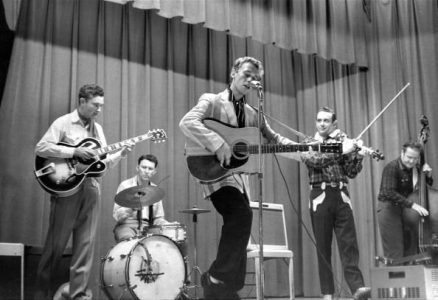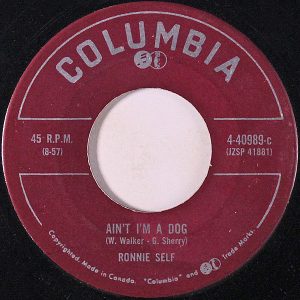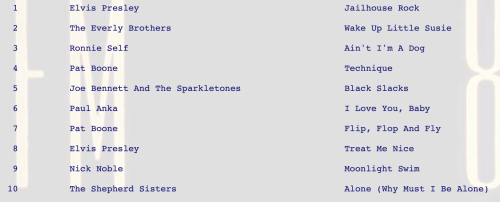#4: Ain’t I’m A Dog by Ronnie Self
City: Dauphin, MB
Radio Station: CKDM
Peak Month: November 1957
Peak Position in Dauphin ~ #3
Peak position in Vancouver ~ did not chart
Peak Position on Billboard Hot 100 ~ did not chart
YouTube: “Ain’t I’m A Dog”
Lyrics: “Ain’t I’m A Dog”
Ronald Keith Self was born in Tin Town, Missouri, in 1938. On the Black Cat website in Europe, Dik de Heer writes “Ronnie Self was his own worst enemy. His self-destructive behavior is probably the main reason why he is no more than a footnote in rock ‘n’ roll history. Hugely talented, both as a singer and a songwriter, he could have been a big star if he hadn’t possessed such an unstable personality. The oldest of five children, Ronnie was born on a farm in rural Missouri. After the war, the family moved to Springfield where his father took a job with the railroad. The signs of instability showed themselves early. On one occasion Ronnie chopped down a tree to block the school bus from getting to his house. Another story has him attacking a teacher with a baseball bat in grade school.”
He got signed with ABC-Paramount, and in April 1956 released his composition “Pretty Bad Blues”. Despite its resemblance to Sun Records artists like Carl Perkins and Elvis Presley, the single didn’t catch on. Dik de Heer writes “Early in 1957, Ronnie joined the Phillip Morris Caravan as the token rockabilly in a country cast. Those who have seen Self perform say that he had the wildest stage act, which gained him the nickname of “Mister Frantic.”

In 1957, Self was the first rock n’ roll recording artist to sign with Columbia Records. This was despite Mitch Miller’s objections. On the label Self released a rockabilly tune called “Flame Of Love”. It didn’t chart. Though Ronnie Self wrote over 300 songs (some that weren’t published), the next release was “Ain’t I’m A Dog” – written by other contemporary songwriters.

“Ain’t I’m A Dog” was written by Wayne Walker and George Sherry. George Sherry was a pseudonym for Troy Martin who was born in Danville, Virginia, in 1911. He wrote songs that started getting attention by the late 40s. Ernest Tubb was the first to record a song credited to Troy Martin (as Troy L. Martin) in 1949 titled “Daddy, When Is Mommy Coming Home”. Other recording artists who took Martin’s songs to the recording studio include “Little” Jimmy Dickens, Dewey Ritter, George Jones, Don Gibson, Porter Wagoner, Willie Nelson, Lefty Frizzell, Tanya Tucker, and The Masters Family. In 1962, through Troy Martin Music, he produced the number-one country hit “Don’t Let Me Cross Over” by Carl Butler and Troy Martin died in Nashville at the age of 65 in 1977.
Wayne Walker was born in 1925 in Quapaw, Oklahoma. He worked as a vacuum cleaner salesman, fire escape salesman, car salesman, and roofer while getting his music career off the ground. He wrote music for the Louisiana Hayride TV variety show. In 1951, Webb Pierce recorded Walker’s country song “If Crying Would Make You Care”. While Jimmy Lee recorded “Love Is Hard To Understand” later that year. Walker recorded his first country single, “You Got The Best Of Me (I Got The Worst Of You)” on the Chess label in 1954. It was covered by Moon Mullican. Other songs written by Walker were recorded by Jimmie Rodgers, Red Sovine, Bob Willis and his Texas Playboys, Johnny Burnette and the Rock n’ Roll Trio, Janis Martin, Sarah Vaughan, Brenda Lee, Kitty Wells, Flatt and Scruggs, Bobby Helms, Mel Willis, Johnny Bond, Marvin Rainwater, Ferlin Husky, Don Gibson, the Kalin Twins, Ray Smith, Crash Craddock, Eddie Cochran, Tab Hunter, Carl Perkins, George Hamilton IV, Johnnie Ray, Floyd Cramer, Teresa Brewer, Burl Ives, Eddy Arnold, Jimmy Dean, Paul Petersen, Patsy Cline, Lenny Welch, Jack Scott, Trini Lopez, Freddie and the Dreamers, Gene McDaniel, Bobby Bare, Perry Como, Charlie Rich, Johnny Cash, Herman’s Hermits, and others.
In 1956, Elvis Presley recorded Walker’s “How Do You Think I Feel”. As well, Ray Price recorded Walker’s “I’ve Got A New Heartache”, which peaked at #2 on the Hot C&W Sides chart later in ’56. And Faron Young’s recording of Walker’s “Turn Her Down” was a Top Ten country hit that year as well. In 1957, Webb Pierce had two #3 hits on the Hot C&W Sides chart with “Holiday for Love” and “It’s My Way”. That year Hank Locklin’s “Living’ Alone” peaked at #4 on the country charts, and Cal Smith took Wayne Walker’s “Why Why” to #2 on the Hot C&W Sides chart.
Walker’s biggest his was “Are You Sincere”, a #3 pop hit for Any Williams in 1958. In 1959, Stonewall Jackson had a minor hit written by Wayne Walker titled “Igloo (The Pride of South Central High)” which was a Top Ten hit in Vancouver. Walker’s “A Rose And A Thorn” was a Top 20 hit for Andy Rose in Vancouver in 1960. Webb Pierce had more success with tunes Walker penned, with Top 5 country hits in the early sixties. These included “Fallen Angel”, “Sweet Lips”, “Memory #1”, “Fool, Fool, Fool”, and “How Do You Talk to A Baby”. Johnny Burnette’s “Little Boy Sad” was a Top 20 pop hit, earning Wayne Walker more recognition.
In 1962, country artist Kitty Wells took “Unloved Unwanted” to #5, and Eddy Arnold took “A Little Heartache” to #3. Patsy Cline had a Top Ten country hit with “Leavin’ On Your Mind” in 1963. In 1967, Walker’s song “All The Time” was his only number-one country hit after Jack Greene’s recording started selling like hotcakes. The recording received the Billboard Country Song of the Year Award. Wayne Walker ended the decade with Porter Wagoner taking his tune “Big Wind” to #3 on the Hot Country Singles chart. In 1979, a posthumous recording of “Are You Sincere” by Elvis Presley was a Top Ten country hit. In 1986, Ricky Scaggs’ recording of “I’ve Got A New Heartache” was the last appearance of a Wayne Walker tune in the Top Ten of the Hot Country Singles chart. Walker died in 1979 at the age of 53.
The lyrics to “Ain’t I’m A Dog” tell a story of an outrageous guy who comes home at 3 AM. His “good gal” tells him that she’s leaving him. He doesn’t beg her to stay, instead he replies “wait a minute baby, let me help you pack.” The guy is all about the chase, and as many women who turn his head the better. This verse sums up his philosophy:
Well, a good lookin’ woman is a-mighty fine,
to give a young man a little peace of mind.
I know it ain’t safe just to kiss and run,
but forget about the danger and think of the fun.
Dave Stephens offers some context for the extreme vocal style of Ronnie Self in “Ain’t I’m A Dog”. “A reason for the more in-your-face style could have come from the fact that one of the first things that Dub Allbritten did when taking on the role of Ronnie’s manager was put him on the road in a touring show, the roster for which consisted of standard country artists all bar Ronnie who was the token rocker. Apparently, our hero (Ronnie Self) did his damnedest to make his portion of the show stand out and, possibly, the extreme voice was the sonic equivalent of the physical contortions/gymnastics that became a standard part of his act. The record also differs from its predecessors in the usage of something along the lines of black doowop vocal backing – for shorthand I’m calling it Coasters-ish – which was highly unusual for Nashville…” Ronnie Self was compared to Little Richard on some of his vocals, and in his stage presence.
“Ain’t I’m A Dog” peaked at #1 in Bethesda (MD), #3 in Dauphin (MB), #4 in Des Moines (IA), #5 in New Orleans, and #10 in Kansas City (MO). Self’s boastful rockabilly anthem “Ain’t I’m a Dog” failed to crack the pop charts nationally in the USA. Internationally, the single made the Top 40 in Sydney, Australia. In addition, “Ain’t I’m A Dog” was a local number-one hit on the country & western station KCKN in Kansas City (KS).
In early 1958, Ronnie Self had another single getting some chart action titled “Bop-A-Lena”. It peaked at #31 in Toronto, and got airplay in Vancouver. It was a Top Ten hit in San Francisco, Indianapolis (IN), Richmond (VA), and Omaha (NE). Across the USA, the single got some airplay in nine states. In Australia, “Bop-A-Lena” climbed to #25. It was Ronnie Self’s only single to crack the Billboard Hot 100, climbing to #63.
The B-side to “Bop-A-Lena” was another song Ronnie Self wrote titled “I Ain’t Going Nowhere”. The lines may have been autobiographical, and fit with other anecdotes told about his life:
Love passed by, the sands keep shifting,
and my lonely heart keeps drifting.
Try to pretend I don’t care…
The next recording, the wild rockabilly tune “You’re So Right For Me’, was slated for release. But then Columbia Records opted to release “Date Bait”.
In 1959, Ronnie Self wrote “Sweet Nothings” which became a #4 pop hit in the USA and Uk for Brenda Lee. The next year, Self’s “I’m Sorry” became the signature song for Brenda Lee after it climbed to #1 on the pop charts in New Zealand and the USA. Brenda Lee stated in her autobiography, Little Miss Dynamite, “Ronnie was burning bridges left and right.” A manager, Dub Albritten, kept doling out money to bankroll Ronnie Self’s chaotic rise to mostly songwriting success.
In 1960, Owen Bradley was in the studio to provide lush strings and backing vocals for Ronnie Self. But unlike Brenda Lee’s “I’m Sorry”, Self’s self-reflective “I’ve Been There” never took off.
In 1961, Self’s “Anybody But Me” was the B-side to Brenda Lee’s “Fool #1”, and charted to #31 on the Billboard Hot 100. The following year, Brenda Lee recorded another Ronnie Self composition titled “Everybody Loves Me But You”. It reached #2 on the Adult Contemporary Singles chart and #6 on the Hot 100.
In 1964, Billy Walker took Ronnie Self’s “Circumstances” to #7 on the Billboard Hot Country Singles chart. In 1965, Ronnie Self wrote “Two Six Packs Away” which became a #15 country hit for Dave Dudley. In 1967, Johnny Darrell recorded the Ronnie Self tune “Come See What’s Left of Your Man”, which became a Top 40 country hit.
In 1969, Ronnie Self’s country gospel song “Ain’t That Beautiful Singing”, recorded by Jake Hess, was awarded a Grammy Award for Best Sacred Performance. In 1971, the Jerry Lee Lewis Sun Records recording of Self’s “Love On Broadway”, was finally released. It became a Top 40 country hit.
However, the man behind the hit songs on the country chart was falling apart. Self was getting a reputation as being too unmanageable for any record label, despite his positives as a singer-songwriter and performer (when he could contain himself). Dik de Heer summarizes, “By the mid-1960s, Mr. Frantic was almost completely out of control. He had added amphetamines and marijuana to his alcohol consumption. After Dub Albritten died in 1971, Ronnie reportedly became completely unhinged. The story goes that when he discovered that his Gold Record of “I’m Sorry” wouldn’t play on his stereo, he burned all of his songwriter awards in front of his publisher’s office on Music Row. ”
Music producer and promoter, Si Siman, told Colin Escott in an interview about Ronnie Self, “When he was straight, he was great to do business with. He was a gentleman. But when he got some juice inside him he’d shoot holes in the wall, fire off a bow and arrow, chase people and try and run ˈem down with a car. He was in and out of jail God knows how many times. His talent was a curse. When success was real close, he’d have only had to do what people were telling him, but he couldn’t handle that – and he blew it.”
Ronnie Self divorced Dorothy Self in 1971. A song he wrote around that time “How Careless Of Me” included these lyrics:
Somewhere I fell down in my loving you,
And my head turned and did not see.
That you were slowly leaving my heart
oh how careless of me.
The Notes for Mr. Frantic Is Boppin’ The Blues state “Self-produced session (June 1981): track 31” and track 31 (the last), is “Waitin’ For The Gin To Hit Me”. It included these lines:
Sittin’ on the floor, Indian style,
waitin’ for my gin to hit me.
Mama say a prayer for her bad child,
waitin’ for my gin to hit me.
Ronnie Self died an alcoholic who’d exhausted his life, in Springfield, Missouri, in 1981 at the age of 43.
In 2013, Kanye West sampled two phrases from Brenda Lee’s “Sweet Nothings”, which were “Uh-huh, honey” and “Alright.” As Ronnie Self wrote “Sweet Nothings”, he was credited as one of the songwriters on Kanye West’s “Bound 2”. In 2014, the British record production duo, Sigma, released an international Top Ten dance hit titled “Nobody To Love”. In the single they sampled a phrase from Brenda Lee’s “Sweet Nothings” with Lee speaking saying “uh huh, honey,” in the song’s intro. Therefore, Ronnie Self is listed as one of the songwriters of “Nobody To Love”.
Born in 1963, Ronnie Self’s son, Roman Self, has picked up the guitar to perform rockabilly in the footsteps of his father. In his childhood, Roman Self showed a musical aptitude. By 1975, at the age of 12, Roman joined his first band while still living with his mother. In 1978, he moved to Nashville to live with his father. He started playing with his father, Ronnie, at local clubs and honky tonks, including Nashville’s world famous Tootsies Orchid Lounge.

Tooties Orchid Lounge, Nashville
In 2003, Roman Self released an album titled A Tribute to Ronnie Self, released on the Rockabilly Hall of Fame label.
December 28, 2024
Ray McGinnis
References:
Dik de Heer, “Ronnie Self,” Black Cat.
Dave Stephens, “Ronnie Self,” Toppermost.co.uk, June 2023.
“Ronnie Self, “Flame Of Love“, Columbia Records, 1956.
“Bob-A-Lena“, Seventeen TV, WOL, Ames (IA), February 1958.
“Wayne Walker,” Nashville Songwriters Hall of Fame.
“Troy Martin,” Allmusic.com.
Jewly Hight, “How Tootsie’s Orchid Lounge helped change country music and Nashville, in just 50 years,” Nashville Scene, November 4, 2010.
Shaun Mather, “Roman Self,” Black Cat.
Ronnie Self, “I’ve Been There“, Decca Records, 1960.

CKDM 730-AM, Dauphin (MB), November 2, 1957

What a sad tale. Thanks.
One could hope all musicians with talent could set aside whatever might sabotage their artistry, but Ronnie Self’s story is a cautionary tale.